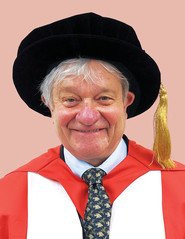
Sir Paul Maxime Nurse is a geneticist and cell biologist, Director of the Francis Crick Institute in London and a Nobel Laureate.
Sir Paul holds a BSc in Biology from the University of Birmingham and a PhD from the University of East Anglia for his research on amino acid pools in Candida utilis. His major work has been on the cyclin dependent protein kinases and how they regulate cell reproduction.
At the University of Edinburgh, between 1973 and 1979, he identified and studied a set of cell cycle defective mutants that formed the basis of much of his future work. In 1979 he set up his own laboratory at the University of Sussex. In 1984, Sir Paul joined the then Imperial Cancer Research Fund (later Cancer Research UK) and in 1987 he identified the human cdc2 homologous gene which codes for the cyclin dependent kinase CDK1. In 1988 he became chair of the Department of Microbiology at the University of Oxford.
Sir Paul was co-recipient of the 2001 Nobel Prize in Physiology or Medicine for the discovery of protein molecules that control the division (duplication) of cells in the cell cycle, which underpins current worldwide research into treatments for cancer and other serious diseases.
Sir Paul has served as President of the Royal Society, Chief Executive of Cancer Research UK and President of Rockefeller University. He has received the Albert Lasker Award, the Gairdner Award, the Louis-Jeantet Prize and the Royal Society's Royal and Copley Medals.
He was knighted by The Queen in 1999, received the Legion d'honneur in 2003 from France, and the Order of the Rising Sun in 2018 from Japan.
In recognition of his contributions to academia and the world, the University has resolved to confer upon him the degree of Doctor of Science honoris causa.




